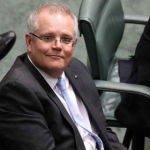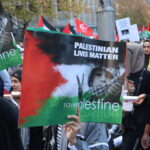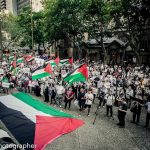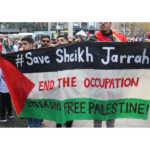Palestinian Race Complaint Levelled Against Government: An Interview with Birchgrove Legal and Nasser Mashni

Australia Palestine Advocacy Network (APAN) vice president Nasser Mashni has filed a case with the Australian Human Rights Commission, which is being described as landmark as it isn’t against any individual or business, but it’s been raised against the Australian government.
Specifically, Mashni is claiming that the Morrison government has been advocating on behalf of the state of Israel via its public statements and diplomatic actions, and further, this is not only hostile to Palestinian Australians, but it breaches their human rights and causes them distinct harm.
The complaint involves three examples that it asserts constitute government advocacy for Israel.
These are the official comments the government made during the Israeli assault on Gaza in May last year, its attempt to block the International Criminal Court (ICC) investigation of Israeli war crimes, as well as its failure to acknowledge that Israel is an occupying force.
Sydney law firm Birchgrove Legal is acting on behalf of Nasser Mashni in relation to the AHRC complaint, arguing that the Morrison government has engaged in racial discrimination based on the provisions under section 9 of the Racial Discrimination Act 1975 (Cth).
Advocating for Israel
Israeli forces subjected the 2 million Palestinians that live in the “open air prison” that is Gaza to an eleven-day long aerial attack last May, which resulted in 248 Palestinians being killed, a quarter of whom were children.
In a 16 May statement, Australia’s permanent UN representative Mitch Fifield said, “Israel unquestionably has the right to defend itself and its people in accordance with international law.” Yet, he makes no mention that it was actually pounding a civilian population in an occupied territory.
In December 2019, ICC prosecutor Fatou Bensouda announced an investigation into alleged Israeli war crimes against Palestinians should go ahead but she first wanted pre-trial confirmation into the unique situation that the court would be exercising its jurisdiction over the occupied territories.
However, the following February, our government filed a brief with the court, stating it doesn’t recognise the state of Palestine, and, therefore, the ICC does not have the authority to exercise its jurisdiction over the territories. This is despite Palestinian having become an ICC state party in 2015.
Apartheid Israel
On 1 February this year, Amnesty International released a report declaring Israel is an apartheid state, detailing its systematic discrimination and oppression of the Palestinian people in the 280 page document.
Apartheid is considered a crime against humanity under the ICC’s Rome Statute.
South Africa’s apartheid regime was dismantled as a result of the pressure of the Anti-Apartheid Movement global boycotting campaign. And today, Boycott, Divestment and Sanctions (BDS) is calling on people around the world to do the same now in relation to Israel.
Sydney Criminal Lawyers spoke to Birchgrove Legal principal solicitor Moustafa Kheir and APAN vice president Nasser Mashni about the on-the-ground consequences the federal government’s Israel advocacy has for Palestinian Australians and what the AHRC complaint sets out to achieve.
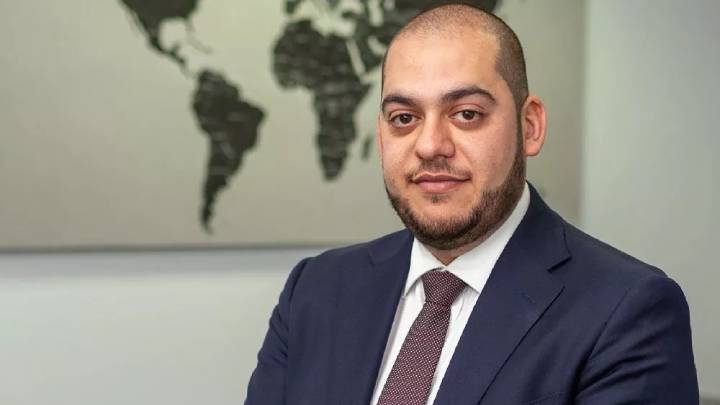
Firstly, Moustafa, you’ve filed a racial discrimination complaint with the Australia Human Rights Commission on the grounds that the Australian government has been advocating on behalf of the Israeli government to the detriment of Palestinian people.
This entails Morrison government statements in regard to Israel’s assault on the people of Gaza last year, as well as its actions involving an International Criminal Court investigation into alleged war crimes.
So, why do the federal government’s actions warrant the complaint?
The Australian government made international and national representations about Australia’s position in response to Israel’s aerial bombardment of Gaza in May 2021, which erased the existence of Israel’s occupation and Israel’s role as an occupying power.
It did this by not using accurate language of international humanitarian law, as recognised by UN Security Council resolutions, UN General Assembly resolutions, and the International Court of Justice.
It chose language that was unclear and confusing. The Australian Government did not identify that Israel had bombed civilian populations and infrastructure in Gaza.
Similarly, the Australian Government has actively discouraged the International Criminal Court from investigating allegations of war crimes and crimes against humanity by all parties to the conflict, including Israeli authorities and Hamas.
In making the complaint, you’re claiming the Morrison government has breached Australian antidiscrimination laws.
However, this isn’t your average case, instead of it involving a community-based incident, it involves Australia’s foreign policy.
How would you say our foreign policy on Israel is personally affecting Palestinian Australians in general?
There is often an assumption that racial discrimination laws don’t apply to the Australian government, but that’s simply not true.
The Australian government is meant to uphold civil and political rights and cultural rights under international law.
If the government decides to actively impair the human rights of Palestinians by encouraging international law bodies to look the other way from the violent denial of their self-determination and other human rights, that has real-life consequences for Palestinian Australians.
It strips their equality before the law, which is a serious harm to anyone’s dignity.
It impacts their ability to freely return to Palestine and maintain their connection to their nationality, country and sacred sites, which is crucial to being Palestinian, to one’s identity, culture and health.
It also has further practical consequences by misleading Australians about the legal status of Palestinians and the Palestinian struggle against Israeli occupation.
Palestinian Australians don’t stop having these human rights because they live in Australia. In fact, Australia has laws to uphold these human rights.
In this complaint, we bring together international law and Australian law on human rights, which is how section 9 of the Racial Discrimination Act is meant to be interpreted and implemented.
Considering the unprecedented nature of the antidiscrimination complaint, how do you think the case is likely to go?
We believe it will be successful because our arguments are consistent with existing authorities on section 9 of the Racial Discrimination Act.
We also believe most Australians will support this action because while they may not understand these issues in-depth, we all want fairness.
I’ll put this one to you Nasser, as it doesn’t directly involve the complaint to the AHRC.
On a single day in May 2018, Israeli forces gunned down 58 unarmed Palestinian protesters on the Gaza border taking part in the Great March of Return rally. These people posed no threat to Israeli forces.
A special meeting of the UN Human Rights Commission following the incident considered launching an independent investigation into the “deteriorating human rights situation”.
Only two of the nations present voted against it: the US and Australia. Can you speak on this?
The way in which Australia most impacts Australian Palestinians is in how relaxed it is in taking an Israel-centric position, domestically and in international forums.
Following this massacre, our government rolled out the standard, tired Israeli talking point: “Israel has a right to defend itself”.
When the UN states that it’s considering an investigation, whatever that investigation might be, one would presume that the reflex action of a member state would be “yes” – well, not if it’s Israel.
Investigations should be independent and should happen irrespective of who the perpetrator might be.
The purpose of an investigation is to find out what happened and if possible ascribe responsibility.
When Australia immediately joined the US in voting against an investigation into a “deteriorating human rights situation”, one must ask what would they support investigating?
This leaves an indelible print on the minds of Australian Palestinians – “you don’t matter”. Fifty eight human lives stolen by a snipers’ bullets don’t matter.
In the past few weeks, following a slew of NGO and Human Rights Organisation reports confirming that Israel is practising the crime of apartheid, Amnesty International also accused Israel of committing the crime of apartheid.
Scott Morrison’s response was a flippant “not all countries are perfect”. There was no engagement with the 280 page report by the world’s leading human rights organisation.
The response was just a dismissive and curt retort. I’d like to say to our PM that not all countries are committing war crimes.
Words matter, and they particularly matter when the leader of a nation says them. Compare this to the government’s response to what’s happening in Ukraine.
The Australian government’s complicity with Israel – absolving them of any responsibility under international law and going even further to defend their actions – is devastating to Australian Palestinians.
We know what apartheid is and what it does to people, families, communities, homes and businesses.
When our prime minister dismisses this, and so many other reports in such an offhand way, he dismisses, maligns and marginalises the human rights of Australian Palestinians.
On a more personal note, Nasser, I believe there was an incident involving one of your children at high school that has implications on why the complaint is necessary?
There have been many instances in my life where I was “othered”: be it for my name, the colour of my skin or religion.
Like any parent, I have tried to protect my children from any of the challenges I faced and hoped that their childhood would be free of many of the confrontations that I endured.
In late 2015, following a horrible terrorist attack in Paris, I was driving my son to school, following a news report on the radio.
I asked my son if there had been any mention of the attack at school, hoping that question might be met with advice that the school had counselled the campus.
I did expect that perhaps there might be some schoolyard bullying, but what I didn’t expect was what I heard.
During Monday morning roll call, my 14-year-old son was not paying attention. So, to get his attention, his teacher asked him if he was busy thinking about how his brothers were going in Paris over the weekend.
Governments have a responsibility to their citizens to progress the human rights of all its citizens. This Australian government, and many before it, have failed to do this for Australian Palestinians.
The Australian government regularly fails to acknowledge that Israel is an occupying power, that Israel, in fact, illegally occupies Palestine, and that Israel breaches international laws.
Australian citizens listening to our government come away thinking that Palestinians are the aggressors.
This creates a situation in Australia that makes Australian Palestinians feel uncomfortable identifying as Palestinian, speaking about Palestine, or even saying the word Palestine.
The Australian government’s language is so important, the conversation our government has with the public creates the public discourse. It shapes media reportage, and this then informs and creates public opinion.
If our government told the truth about Israel’s belligerent occupation and Israel’s breaches of international law, Australians would be far better informed and the space created would allow Australian Palestinians the opportunity to express themselves without fear of vilification, ostracization and humiliation.
Moustafa, back to you. If your complaint is successful, what sort of repercussions could it have on how the Australian government operates?
Governments can have various positions on foreign policy. Where those approaches impair human rights, the Australian government must stop and reflect.
Where their positions impair the human rights of people here in Australia based on race, ethnicity or national origin, there will naturally be consequences under Australian law.
Australia must take those human rights obligations seriously.
And lastly, Moustafa, what sort of changes does the complaint you’ve filed on behalf of Nasser Mashni broadly call for?
Our complaint calls for the following changes. It calls for the government, when making future representations to the United Nations and national press statements, to acknowledge that Israel is an occupying power that occupies Palestinian land and outlines the special obligations attached to being an occupying power under international law.
It also calls for the government to identify when Israel has breached international law and the actions that constitute the breach.
Further, it calls on the government to indicate that it supports the ICC investigation of allegations of war crimes and crimes against humanity by all parties, including Israeli authorities and Hamas.
And the final point is calling on the Australian government to acknowledge that the human rights of Palestinian Australians are diminished by the ongoing denial of safe, free and secure access and return to their ancestral homelands.



